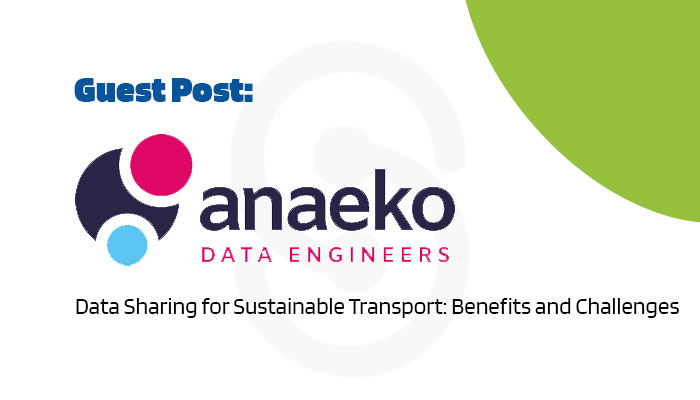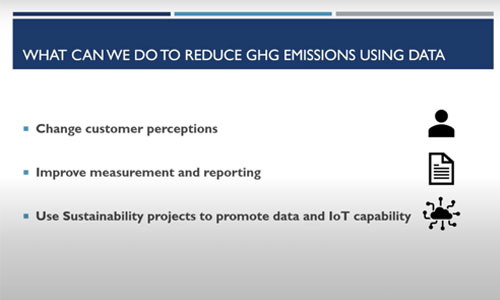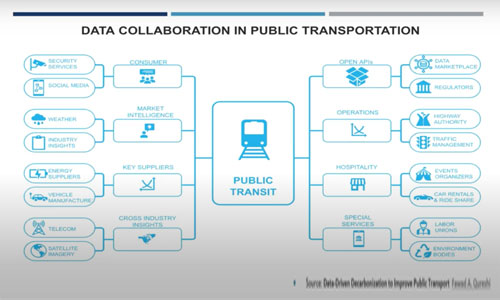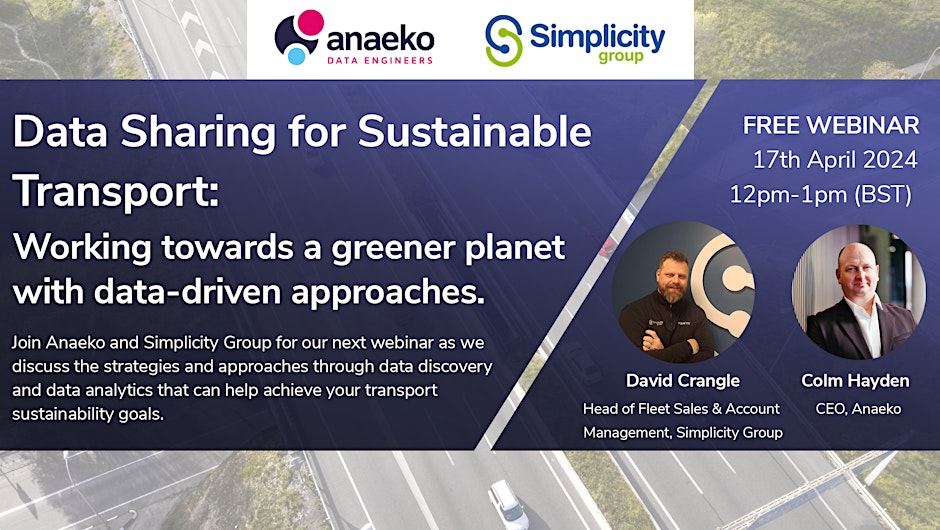
Transportation accounts for a significant portion of global carbon emissions, with the road transport sector being a major contributor. Transport-related emissions make up 16.2% of the global total, and road transport alone accounted for 11.9%. In the UK, transport contributes to 34% of the country’s carbon emissions. The challenges are expected to intensify as road use and aviation demand increase in the coming years. These alarming statistics highlight the need for immediate action to curb emissions and adopt sustainable practices in the transportation industry.
Let’s explore how data-driven approaches can make a significant impact in our journey towards a greener planet and 3 challenges below that can be addressed.
About the Author:
Anaeko is an ISO 9001 and ISO 27001 certified company operating since 2004 in North America and Europe. They deliver secure, scalable and reliable data optimisation services to Large Enterprises, Technology Innovators and Research Agencies in highly regulated industries across public and private sector.
Contact the Author
Emma Foster,
Anaeko

-
Changing Customer Perceptions and Behaviours
To make a substantial impact on carbon emissions, it is crucial to change customer perceptions and behaviours. Various strategies can be employed to achieve this, such as incentivising public transport use through rewards programs and providing carbon calculators to showcase the environmental benefits of using sustainable transportation options. Creating a positive and modern experience for public transport users can significantly contribute to reducing emissions. By fostering a culture that encourages and rewards sustainable choices, we can drive a shift towards more eco-friendly transportation practices.
-
Enhancing Measurement and Reporting of Emissions
Accurate measurement and reporting of greenhouse gas emissions are essential for developing effective sustainability strategies. Leveraging telematics and data analytics can greatly improve the measurement and reporting processes across different sectors and vehicle types. For instance, fleet telematics, transport operator telematics, and individual car telematics can provide valuable insights and drive the adoption of greener behaviours. Sustainability initiatives offer a unique opportunity to showcase the value of data projects and demonstrate their return on investment, as the impact of these projects can be easily tracked and measured.
-
Building a Data-Driven Culture
Establishing a data-driven culture within organisations is critical for promoting sustainability. This culture involves combining human insights with AI capabilities to align business outcomes with environmental goals. Emphasising data quality, governance, and continuous improvement ensures that organisations maximise their data’s potential while minimising their environmental impact. By continuously striving for better efficiency and consumption reduction, businesses can take the lead in driving sustainability efforts. Furthermore, empowering dedicated carbon reduction teams can enable companies to identify and implement sustainable initiatives that generate financial benefits while reducing carbon emissions.
The MACH Approach: A Sustainable Data Architecture
The MACH approach is one framework that promotes a data-driven culture and a sustainable data architecture. One way to achieve massive gains in sustainability and business benefit.
M – stands for mircoservices – domain and business unit specific technologies running microservices for that area.
A – stands for API – API-enabled architectures so that data can be accessed and shared easily and securely between organisations to enhance collaboration.
C – stands for cloud native – using SaaS technologies with inbuilt functionality without having to go through the complexity of large and major upgrades with supply chain systems.
H – stands for headless – headless means you de-couple the back-end from the front-end user interface. That means you can design a front-end user experience that is relevant to your business, helping increase your speed to market and success by leveraging existing back-end technology and architecture.
The MACH approach enhances collaboration and fosters open standards, enabling secure data sharing and integration across different organisations. Collaborative efforts between industry stakeholders, supply chains, and consumers are crucial for driving down global carbon emissions effectively. The MACH approach facilitates efficient data management and creates opportunities for innovative solutions to address sustainability challenges in various sectors, such as public transport, energy supply, and vehicle manufacturing.
Having an open standards and secure data sharing approach is about everybody taking responsibility for their own area but also engaging with supply chains, consumers, and across industry to deliver real benefits for example in security services you can use computer vision technology, on a bus stop or train platform, to highlight specific areas of traffic chaos due to crashes, then communicate this to consumers informing them directly that services are interrupted or running late.

Reducing Carbon Emissions through Technology and Collaboration in Northern Ireland
Northern Ireland is in a unique position to influence and improve within the transport sector with innovative technology already being rolled out including Wrightbus world’s first hydrogen-powered double-deck bus, the most efficient double-deck, battery-electric bus in the world, consuming around half the energy of its closest UK rival. Northern Ireland is lucky enough to have one operator across bus and rail which means services can be enhanced with joined departments, the right tools, and the right people, this can be seen in advancements like the new zero emissions ferry from Artemis. Artemis Technologies’ zero-emission vessels are the greenest workboats and soon to be passenger ferries. A partnership with Condor Ferries to operate a pilot scheme using the first EF-24 Passenger 150-person capacity ferry ‘Zero’, launching in 2024 will run between Belfast and Bangor in Northern Ireland. Fuel savings of up to 85 per cent will be £2.6m compared with a conventional high-speed diesel ferry. Northern Ireland is world leading in technology innovation and can bring more sustainable projects and more employment with collaboration and partnership with universities seen with the joint venture with Queen’s University and Wrightbus. An intellectual property powerhouse in designing and developing new systems for sustainability.
We have outlined the importance of changing customer perceptions and behaviours, improving measurement and reporting of greenhouse gas emissions, and establishing data-driven cultures within organisations. The benefits of collaboration, open standards, and the use of emerging technologies show how data-driven approaches can make a significant impact in our journey towards a greener planet. Read Anaeko’s latest case study: Anaeko Data Insights helps NI Water address the climate emergency.
Join our next webinar:
Join Simplicity Group and Anaeko for our next webinar as we discuss the strategies and approaches through data discovery and data analytics that can help achieve your transport sustainability goals


